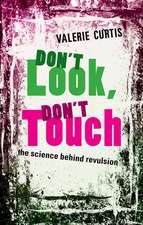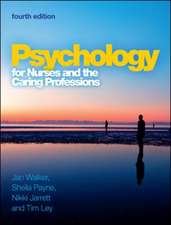Face to Face with Emotions in Health and Social Care
Autor Benjamin Grayen Limba Engleză Paperback – 11 iun 2014
| Toate formatele și edițiile | Preț | Express |
|---|---|---|
| Paperback (1) | 382.75 lei 6-8 săpt. | |
| Springer – 11 iun 2014 | 382.75 lei 6-8 săpt. | |
| Hardback (1) | 390.08 lei 6-8 săpt. | |
| Springer – 10 mai 2012 | 390.08 lei 6-8 săpt. |
Preț: 382.75 lei
Nou
Puncte Express: 574
Preț estimativ în valută:
73.24€ • 78.32$ • 61.07£
73.24€ • 78.32$ • 61.07£
Carte tipărită la comandă
Livrare economică 17 aprilie-01 mai
Preluare comenzi: 021 569.72.76
Specificații
ISBN-13: 9781489989826
ISBN-10: 148998982X
Pagini: 204
Ilustrații: XII, 192 p.
Dimensiuni: 155 x 235 x 11 mm
Greutate: 0.29 kg
Ediția:2012
Editura: Springer
Colecția Springer
Locul publicării:New York, NY, United States
ISBN-10: 148998982X
Pagini: 204
Ilustrații: XII, 192 p.
Dimensiuni: 155 x 235 x 11 mm
Greutate: 0.29 kg
Ediția:2012
Editura: Springer
Colecția Springer
Locul publicării:New York, NY, United States
Public țintă
Professional/practitionerCuprins
Introduction to labour in health and social care. – Introduction to literature and key concepts. – Health and social care policy and practice. – The local areas and services. – Sample, methods, and methodology. – Emotions and nursing. – Learning to care in student nursing. – The clinical contexts of emotional labour. – Emotions in frontline social care. – Emotions, ethnicity,and the case of child protection. – Managing emotions in education and supervision. – Conclusion: Emotional labor and cultural capital. -References.- Appendix.
Notă biografică
Dr Benjamin Gray has conducted extensive research in health, social care and education, with a particular focus on social exclusion, stigma and inequalities in mental health. Ben has also been involved in research with children, mothers and their families in Tower Hamlets, East London, which has a high population of Bangladeshis, Somalis and refugees and which is recognised as one of the most deprived areas in the United Kingdom. He has conducted research on emotions in organisations, particularly in nursing and social work; work for the RCN (Royal College of Nursing); stakeholder views on multiple sclerosis; carers for people with mental health problems, especially young carers; and most recently worked as a Senior Research Fellow at Canterbury Christ Church University on a national project that studied the values of students in Higher Education, including student volunteering in health and social care, which led to a guest editorship of the Journal of Academic Ethics. He has written many papers on these subjects and presented research findings at high profile conferences.
Textul de pe ultima copertă
Among the earliest lessons learned by care providers are those concerning the emotions: understanding those of clients, and not letting one’s own interfere with providing quality care. And since so many clients have been scarred by serious illness or traumatic events, this instruction is not only crucial but must be updated regularly for professionals to stay engaged with clients and avoid burnout
The collective experience of the more than fifty providers, clients, and family members interviewed in Face to Face with Emotions in Health and Social Care reinforces these vital lessons, illustrating the centrality of emotions to the caring professions, the challenges they present in clinical contexts, and their therapeutic potential. Interviewees’ candid discussion of mental illness, child abuse, HIV/AIDS, and other traumas demonstrate the emotional nuances involved in providing intervention, encouragement, and support. And chapters build on recent social theory and research on emotional regulation and social capital to explore key affective issues in the healing professions, such as:
The profound lessons found in Face to Face with Emotions in Health and Social Care benefit a wide range of frontline health and mental health providers, including therapists, nurses, and counselors, at all stages of their careers.
From the Reviews…
Face to Face with Emotions in Health and Social Care offers profound insights into the labour of emotions in nursing and social work. The positivetherapeutic potential of engaging with people's emotions is observed and assessed. Lessons are drawn from studies in primary care, AIDS/ HIV, children's oncology, mental health, refugee exile, disadvantaged groups and child protection. The book describes the ways that nurses and social care staff learn to care and engage people's emotions in education and training.
The book is a must read for nurses, social workers, counsellors, therapists, psychologists and frontline staff who have to 'read', manage and help people cope with feelings of trauma, fear, abuse, illness and death. The book suggests that engaging with the so-called "little things" of people's emotions is the building block of supportive, therapeutic and frontline care. -- Dr. Monica Noronha, University of Kent
The collective experience of the more than fifty providers, clients, and family members interviewed in Face to Face with Emotions in Health and Social Care reinforces these vital lessons, illustrating the centrality of emotions to the caring professions, the challenges they present in clinical contexts, and their therapeutic potential. Interviewees’ candid discussion of mental illness, child abuse, HIV/AIDS, and other traumas demonstrate the emotional nuances involved in providing intervention, encouragement, and support. And chapters build on recent social theory and research on emotional regulation and social capital to explore key affective issues in the healing professions, such as:
- Emotional labor in health and social care.
- Building a language and a picture of emotions.
- Gender divisions in emotional labor.
- Tensions between emotional support and social control in mental health care.
- Emotions and cultural and religious sensitivity.
- Managing emotional labor in education and supervision.
The profound lessons found in Face to Face with Emotions in Health and Social Care benefit a wide range of frontline health and mental health providers, including therapists, nurses, and counselors, at all stages of their careers.
From the Reviews…
Face to Face with Emotions in Health and Social Care offers profound insights into the labour of emotions in nursing and social work. The positivetherapeutic potential of engaging with people's emotions is observed and assessed. Lessons are drawn from studies in primary care, AIDS/ HIV, children's oncology, mental health, refugee exile, disadvantaged groups and child protection. The book describes the ways that nurses and social care staff learn to care and engage people's emotions in education and training.
The book is a must read for nurses, social workers, counsellors, therapists, psychologists and frontline staff who have to 'read', manage and help people cope with feelings of trauma, fear, abuse, illness and death. The book suggests that engaging with the so-called "little things" of people's emotions is the building block of supportive, therapeutic and frontline care. -- Dr. Monica Noronha, University of Kent
Caracteristici
Explores the complex, difficult emotions of nurses, doctors, social workers, and family counselors in frontline health and social care Discusses emotional labor in student nurse and social care education Presents a new model of emotion work that breaks from traditional approaches? Includes supplementary material: sn.pub/extras








![Promoting Psychological Well-Being in Children with Acute and Chronic Illness: A Step-By-Step Resource [With CD (Audio)]](https://i2.books-express.ro/bt/9781843109679/promoting-psychological-well-being-in-children-with-acute-and-chronic-illness.jpg)


